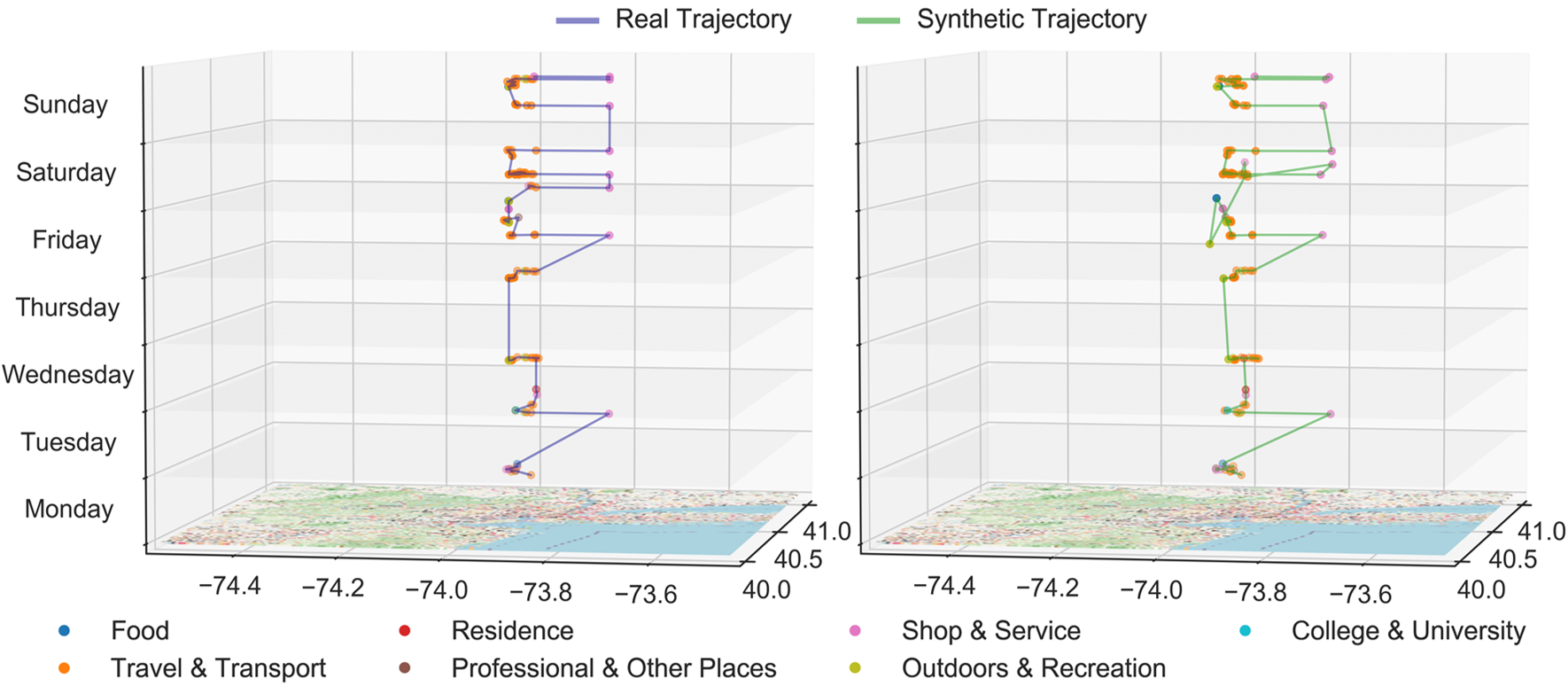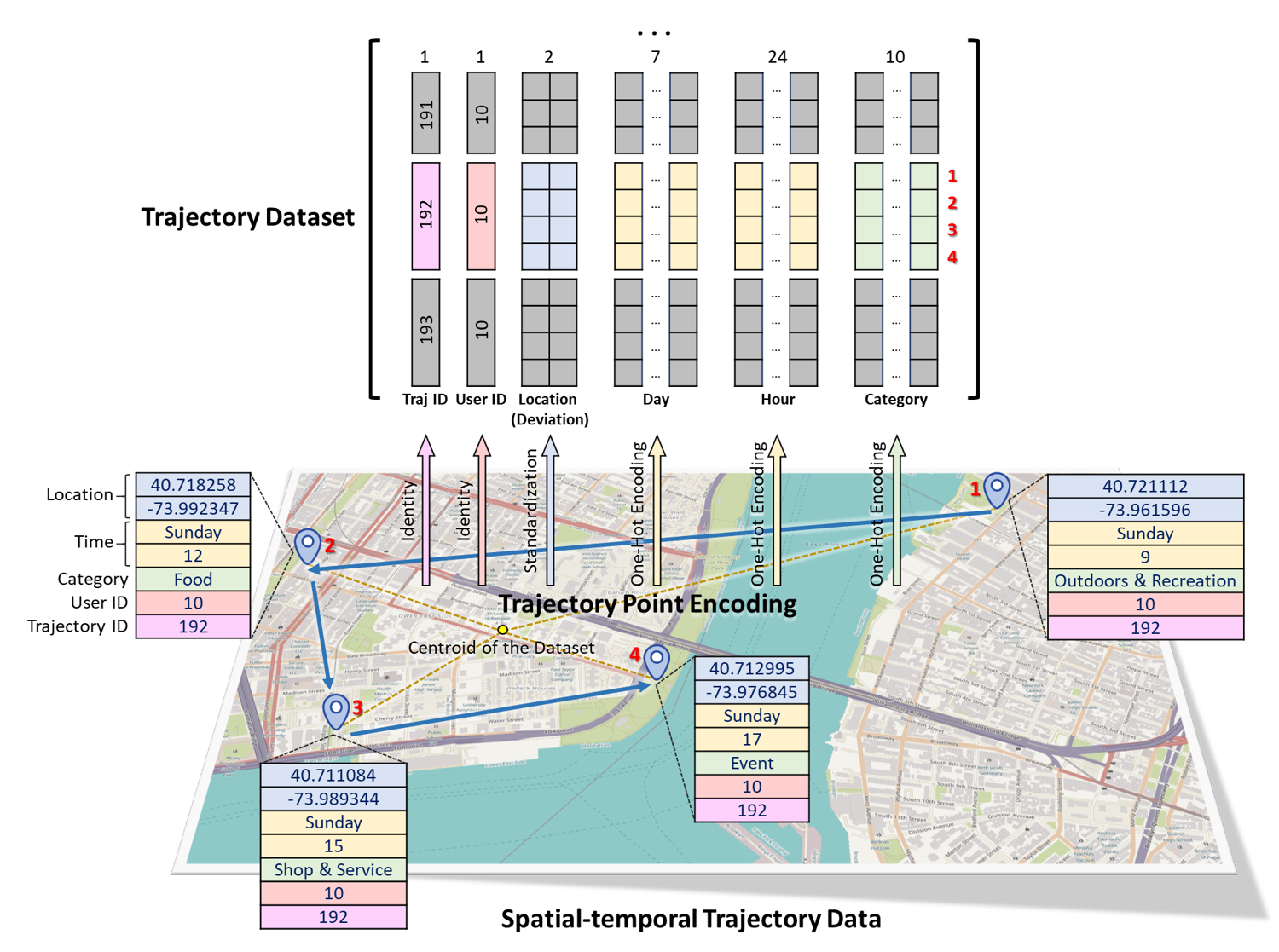LSTM-TrajGAN: A Deep Learning Approach to Trajectory Generation and Privacy Protection
The prevalence of location-based services contributes to the explosive growth of individual-level location trajectory data and raises public concerns about privacy issues. In this research, we propose a novel LSTM-TrajGAN approach, which is an end-to-end deep learning model to generate privacy-preserving synthetic trajectory data for data sharing and publication. We design a loss metric function TrajLoss to measure the trajectory similarity losses for model training and optimization. The model is evaluated on the trajectory-user-linking task on a real-world semantic trajectory dataset. Compared with other common geomasking methods, our model can better prevent users from being re-identified, and it also preserves essential spatial, temporal, and thematic characteristics of the real trajectory data. The model better balances the effectiveness of trajectory privacy protection and the utility for spatial and temporal analyses, which offers new insights into the GeoAI-powered privacy protection for human mobility studies.
If you find our code or ideas useful for your research, please cite our paper:
Rao, J., Gao, S.*, Kang, Y. and Huang, Q. (2020). LSTM-TrajGAN: A Deep Learning Approach to Trajectory Privacy Protection. In the Proceedings of the 11th International Conference on Geographic Information Science (GIScience 2021), 12:1--12:17.
@InProceedings{rao_et_al:LIPIcs:2020:13047,
author = {Jinmeng Rao and Song Gao and Yuhao Kang and Qunying Huang},
title = {{LSTM-TrajGAN: A Deep Learning Approach to Trajectory Privacy Protection}},
booktitle = {11th International Conference on Geographic Information Science (GIScience 2021) - Part I},
pages = {12:1--12:17},
series = {Leibniz International Proceedings in Informatics (LIPIcs)},
ISBN = {978-3-95977-166-5},
ISSN = {1868-8969},
year = {2020},
volume = {177},
editor = {Krzysztof Janowicz and Judith A. Verstegen},
publisher = {Schloss Dagstuhl--Leibniz-Zentrum f{\"u}r Informatik},
address = {Dagstuhl, Germany},
URL = {https://drops.dagstuhl.de/opus/volltexte/2020/13047},
URN = {urn:nbn:de:0030-drops-130471},
doi = {10.4230/LIPIcs.GIScience.2021.I.12},
annote = {Keywords: GeoAI, Deep Learning, Trajectory Privacy, Generative Adversarial Networks}
}
LSTM-TrajGAN uses the following packages with Python 3.6.3
- numpy==1.18.4
- pandas==1.1.5
- tensorflow-gpu==1.13.1
- Keras==2.2.4
- geohash2==1.1
- scikit-learn==0.23.2
Convert csv files to one-hot-encoded npy files.
python data/csv2npy.py --load_path dev_train_encoded_final.csv --save_path train_encoded.npy --tid_col tid
Where load_path is the path to csv file, save_path is the path to save npy file, tid_col is the column name of trajectory id.
Train the LSTM-TrajGAN model using the preprocessed data.
python train.py 2000 256 100
Where 2000 is the total training epochs, 256 is the batch size, 100 is the parameter saving interval (i.e., save params every 100 epochs).
Generate synthetic trajectory data based on the real test trajectory data and save them to results/syn_traj_test.csv.
python predict.py 1900
Where 1900 means we load the params file saved at the 1900th epoch to generate synthetic trajectory data.
Evaluate the synthetic trajectory data on the Trajectory-User Linking task using MARC.
python TUL_test.py data/train_latlon.csv results/syn_traj_test.csv 100
Where data/train_latlon.csv is the training data, results/syn_traj_test.csv is the synthetic test data, 100 is the embedder size.
The data we used in our paper originally come from the Foursquare NYC check-in dataset.
We mainly referred to these two works:
May Petry, L., Leite Da Silva, C., Esuli, A., Renso, C., and Bogorny, V. (2020). MARC: a robust method for multiple-aspect trajectory classification via space, time, and semantic embeddings. International Journal of Geographical Information Science, 34(7), 1428-1450. Github
Keras-GAN: Collection of Keras implementations of Generative Adversarial Networks (GANs). Github


